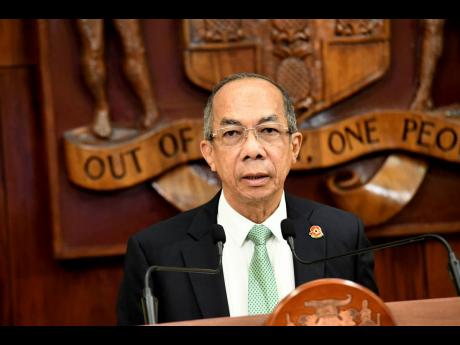Horace Chang | Jamaica’s international cooperation in law enforcement
The complex and global nature of transnational organised crime poses a significant threat not just to Jamaica, but to the entire Latin America and the Caribbean (LAC) region. Over the past couple of years, there has been a marked upsurge in homicide rates throughout the entire LAC region. This underscores the need for unified and coordinated efforts among nations, recognising that crime transcends borders and has no respect for national boundaries.
Amid these challenges, concerns have been raised by members of the diaspora, particularly those residing in the United States, regarding Jamaica’s failure to utilise their professional expertise in the fight against crime. They have often emphasised the wealth of talent and experience that resides within their ranks. Nevertheless, it is crucial to acknowledge and address these concerns, while recognising the importance of structured cooperation within appropriate legal frameworks. As the minister with responsibility for national security, it is my duty to address the concerns of the diaspora and the wider society, and to outline the channels for potential collaboration and partnership.
LEGAL FRAMEWORKS
It is to be noted that international cooperation in law enforcement must be based on an established and well-documented legal framework. This is to ensure that the rights, freedoms, and liberties of individuals are upheld at all times. Further, such cooperation occurs through government-to-government channels and department-to-department collaboration, and not at the level of community-based organisations or any other groupings. Consequently, bilateral cooperation has remained a key priority of this Government in addressing transnational criminal activities. This means that the government is constantly exploring efforts not just to strengthen existing partnerships, but to expand cooperation in new and refreshed ways that specifically target cross-border criminal enterprises.
BILATERAL PARTNERSHIPS
Jamaica currently enjoys excellent cooperation with its critical security partners, which comprise the ‘ABC’ countries – ‘America, Britain, and Canada. The areas of collaboration and cooperation include training, intelligence and information sharing, and joint operations. In relation to the United States, all the federal law enforcement agencies involved in the fight against transnational organised crime are working closely with their local counterparts in Jamaica, through the appropriate legal framework. These include the Drug Enforcement Agency (DEA); the Bureau of Alcohol, Tobacco, Firearms and Explosives (ATF); the US Postal Inspection Service (USPIS); and the United States Marshals Service (USMS).
At the municipal level, the Jamaica Constabulary Force (JCF) has a strong and robust relationship with one of the largest municipal police departments in the United States – the New York City Police Department (NYPD). This collaboration embodies a mutually beneficial partnership between both departments, and is characterised by mutual respect and the sharing of best practices. Additionally, we have police officers in all our Jamaican missions in the United States, which include a security attaché and a deputy in Washington, DC, a security attaché in both Miami and New York, and a liaison officer at the NYPD Intelligence Bureau. This demonstrates the strong collaboration between Jamaica and the United States in the fight to disrupt and deter those involved in transnational criminal activities. We also maintain similar relations with Canada and the United Kingdom, through the Royal Canadian Mounted Police (RCMP) and the National Crime Agency (NCA), respectively.
JOINT TASK FORCE INITIATIVES
Strengthened cooperation and interoperability have allowed the joint task force approach to reap tremendous success operationally. Initiatives such as the Jamaica Fugitive Apprehension Team (JFAT), which collaborates with the USMS, demonstrate the effectiveness of international cooperation in apprehending fugitives and ensuring offenders are brought to book.
This is evidenced by the positive results we have had in terms of the number of arrests and extraditions of US fugitives. Additionally, the Fusion Centre, which was launched in January 2023, is a focal point of cooperation where all relevant agencies share information and intelligence. This is aimed at putting a serious dent in transnational criminal activities that continue to contribute to our persistently high murder rate.
CITIZEN SECURITY PLAN
In alignment with Plan Secure Jamaica, the government continues to pursue its three strategic objectives, namely: 1) strengthening our law enforcement capacity, which includes international cooperation and partnership; 2) ensuring a robust and effective legislative framework to support law enforcement; and 3) effecting social transformation of our most challenged and vulnerable communities.
It is essential, therefore, to emphasise that opportunities for every Jamaican, whether home or abroad, to participate in and contribute to Jamaica’s development are not only available, but also actively promoted. In fact, a mechanism based on a memorandum of understanding (MOU) between the Ministry of Foreign Affairs and Foreign Trade and the Jamaica Social Investment Fund (JSIF) was set up specifically to facilitate the diaspora’s involvement in community development projects. These include skills training, youth education, entrepreneurial workshops, and infrastructure development, critically aimed at fostering social transformation and economic development in under-resourced areas. These are all important focus areas of the government’s crime prevention and youth engagement programmes.
Further, initiatives like Project STAR, which was recently listed on the Jamaica Social Stock Exchange (JSSE), provide opportunities for transparent, sustainable funding and collaboration between the private sector, law enforcement, and the community, to drive social transformation. This reinforces the fact that there is no shortage of avenues for all interested parties to have meaningful partnership and cooperation with their beloved country.
The government remains committed to maintaining and strengthening international cooperation in law enforcement, in order to combat the scourge of transnational organised crime. Collaboration with our international partners is critical in achieving this outcome and, indeed, everyone has a role to play. We are confident that, together, we will overcome the challenges posed by transnational criminal activities and ultimately create a safer, more secure future for all Jamaicans.
Dr Horace Chang is Jamaica’s deputy prime minister and minister of national security. He is also the member of parliament for North West St James. Send feedback to securityminister@mns.gov.jm


